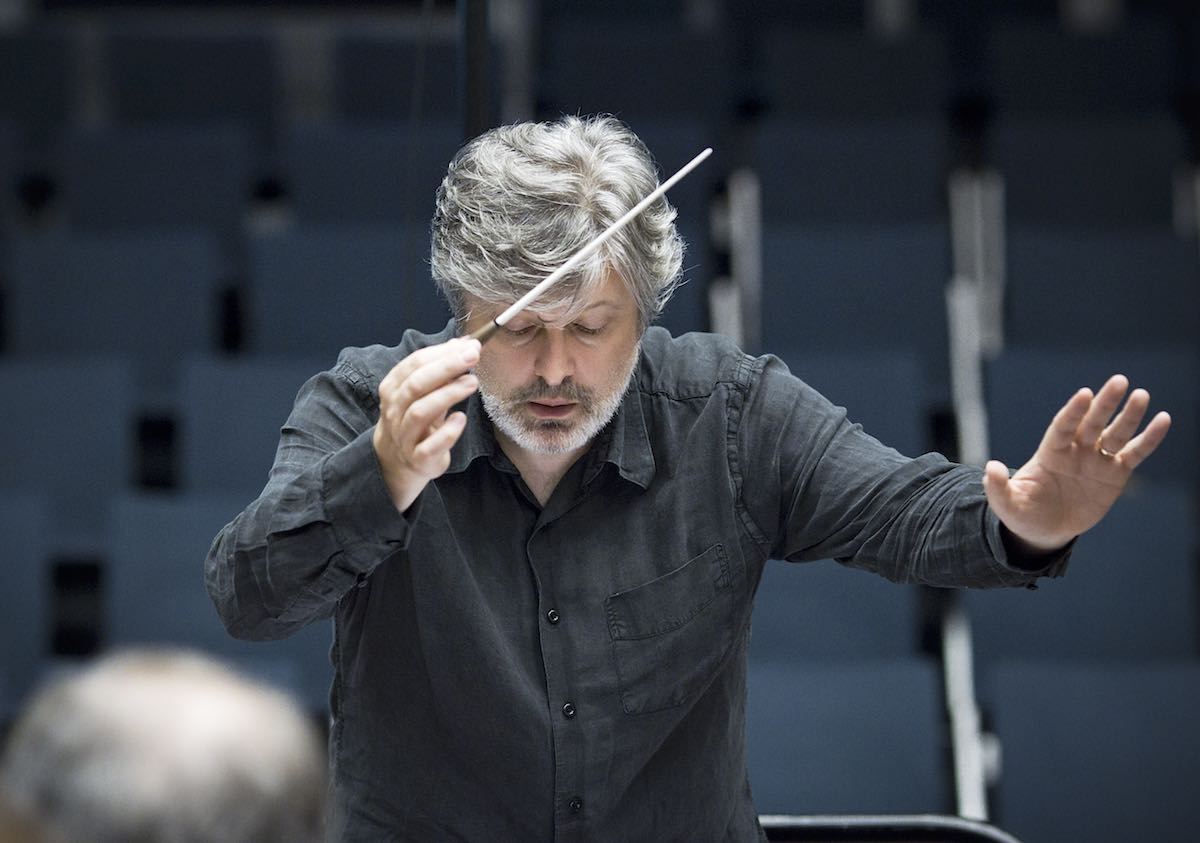
James MacMillan
In recent years James MacMillan has contributed three major works to the oboe and cor anglais repertoire. Most recently his Oboe Concerto, written for Nicholas Daniel, has been performed and recorded to wide critical acclaim. Earlier he also wrote a Cor Anglais Concerto (The World’s Ransoming) for Christine Pendrill (Principal Cor Anglais, London Symphony Orchestra) and also In Angustiis… II in response to the events of 9/11.
Oboe Concerto
This work was written for the Britten Sinfonia and Nicholas Daniel, and is dedicated to him. It is in three movements. The first opens with a gradual building up of rhythmic layers on violas, bassoon and trumpet before the soloist joins in. Suddenly the music is thrown forward by a metrical modulation and becomes very fast, flighty and virtuosic. Structurally, the music eventually goes into reverse before a solemn coda.
The second movement is based on an earlier work for solo oboe, in angustiis… The solo material is expressive and sad, and enters into much dialogue with other wind instruments throughout. The reflective character of the movement is interrupted by little dyadic patterns, various pizzicato outbursts, some scherzo-like material and agitated faster passages, but the principal mood is introverted and cantabile.
The last movement begins brashly and has a clownish character. The overall feeling is extrovert and dramatic, showing off the oboe in fast display. Some of the original ideas from the opening movement are re-introduced in new guises, before an exultant and joyous ending.
James MacMillan
To read an interesting blog post with interviews of Nicholas Daniel and James MacMillan, CLICK HERE

Click here to view sheet music
The World’s Ransoming
The World’s Ransoming is the first of three interrelated works forming a triptych, commissioned by the London Symphony Orchestra. The second work is a Cello Concerto for Mstislav Rostropovich and the third work a large symphonic score Symphony: Vigil , conducted at its premiere by Rostropovich. All three relate to the events and liturgies of the Easter Triduum, Maundy Thursday, Good Friday and the Easter Vigil.
The World’s Ransoming focuses on Maundy Thursday and its musical material includes references to plainsongs for that day, Pange lingua and Ubi caritas as well as a Bach chorale (Ach wie nichtig) which I have heard being sung in the eucharistic procession to the altar of repose. The cor anglais part emerges from the orchestra to carry the lamenting ritual through a long, slow and delicately scored introduction and then through a process of metric gear-changes as the music becomes more animated.
Although the music is through-composed and seamless, a series of trios emerge to carry the music forward. The cor anglais is first joined by a pair of bassoons, then a pair of cellos and later two horns, two percussionists, two piccolos and, briefly, two violins. The impetus of this 20 minute work grows cumulatively with a sense of urgent anticipation involving an increasingly violent and dramatic interplay of materials, taken from their liturgical sources. After the upheaval the music eventually subsides, the cor anglais returning to its original long, slow keening melody while the orchestral context shifts its perspective. Bleak, wooden percussive sounds finally manage emerge to bring the music to a close, while also setting the scene for the next piece in the cycle, the Cello Concerto.
The title came about through reflection on the melody and words of St Thomas Asquinas’ hymn, Pange lingua:
Of the glorious Body telling,
Oh my tongue, its mysteries sing,
And the Blood, all price excelling,
Which the world’s eternal King
In a noble womb once dwelling,
Shed for the world’s ransoming.
James MacMillan

Click here to view sheet music
in angustiis… II
in angustiis was the original title of Haydn’s Mass in Time of War (Missa in Angustiis), which literally means ‘Mass in Time of Anguish’. I wrote two short pieces with this title after September 11, one for piano and one for an assortment of instruments (oboe, cello and voice). The piano piece is based on clusters and an old melody, L’homme armée – a song sung in the time of war. The music for the other soloists is like a melancholy reflection.
James MacMillan

About James MacMillan
James MacMillan read music at Edinburgh University and took Doctoral studies in composition at Durham University with John Casken. After working as a lecturer at Manchester University, he returned to Scotland and settled in Glasgow. The successful premiere of Tryst at the 1990 St Magnus Festival led to his appointment as Affiliate Composer of the Scottish Chamber Orchestra. Between 1992 and 2002 he was Artistic Director of the Philharmonia Orchestra’s Music of Today series of contemporary music concerts. MacMillan is internationally active as a conductor, working as Composer/Conductor with the BBC Philharmonic between 2000 and 2009, and appointed Principal Guest Conductor of the Netherlands Radio Chamber Philharmonic from 2010. He was awarded a CBE in January 2004.
In addition to The Confession of Isobel Gowdie, which launched MacMillan’s international career at the BBC Proms in 1990, his orchestral output includes his first percussion concerto Veni, Veni, Emmanuel, premiered by Evelyn Glennie in 1992 and which has since received close to 500 performances worldwide. MacMillan’s music has been programmed extensively at international music festivals, including the Edinburgh Festival in 1993, the Bergen Festival in 1997, the South Bank Centre’s 1997 Raising Sparks festival in London, the Queensland Biennial in 1999, the BBC Barbican Composer Weekend in 2005 and the Grafenegg Festival in 2012. A documentary film portrait of MacMillan by Robert Bee was screened on ITV’s South Bank Show in 2003.
Works by MacMillan from the 1990s also include Seven Last Words from the Cross for chorus and string orchestra, screened on BBC TV during Holy Week 1994, Inés de Castro, premiered by Scottish Opera in 1996 and given a second production in 2015, a triptych of orchestral works commissioned by the London Symphony Orchestra: The World’s Ransoming, a Cello Concerto for Mstislav Rostropovich, and Symphony: ‘Vigil’ premiered under the baton of Rostropovich in 1997, and Quickening for The Hilliard Ensemble, chorus and orchestra, co-commissioned by the BBC Proms and the Philadelphia Orchestra.
MacMillan works composed in the 2000s include Piano Concerto No.2 first performed with choreography by Christopher Wheeldon at New York City Ballet, A Scotch Bestiary commissioned to inaugurate the new organ at Disney Hall with soloist Wayne Marshall and the Los Angeles Philharmonic conducted by Esa-Pekka Salonen, and The Sacrifice premiered and toured by Welsh National Opera in 2007. His St John Passion, co-commissioned by the LSO, Royal Concertgebouw Orchestra, Boston Symphony Orchestra and Berlin Radio Choir, was premiered under the baton of Sir Colin Davis in 2008.
The past five years have brought a successful sequence of concertos: for violinist Vadim Repin, pianist Jean-Yves Thibaudet (his third piano concerto), oboist Nicholas Daniel, violist Lawrence Power and percussionist Colin Currie (his second percussion concerto). Orchestral scores have included Woman of the Apocalypse premiered by Marin Alsop at the Cabrillo Festival and performed by the São Paulo Symphony in 2014, and Symphony No.4 premiered at the 2015 BBC Proms. Works with choir include a festive setting of the Gloria (to mark the 50th anniversary of the consecration of Coventry Cathedral) and a new setting of the St Luke Passion for chorus and chamber orchestra. His one-act chamber opera Clemency has been performed in London, Edinburgh and Boston. 2014 saw MacMillan launching a new music festival in his home town of Cumnock.
James MacMillan was awarded a Knighthood in the 2015 Queen’s Birthday honours. He is published exclusively by Boosey & Hawkes.
Reprinted by kind permission of Boosey & Hawkes



